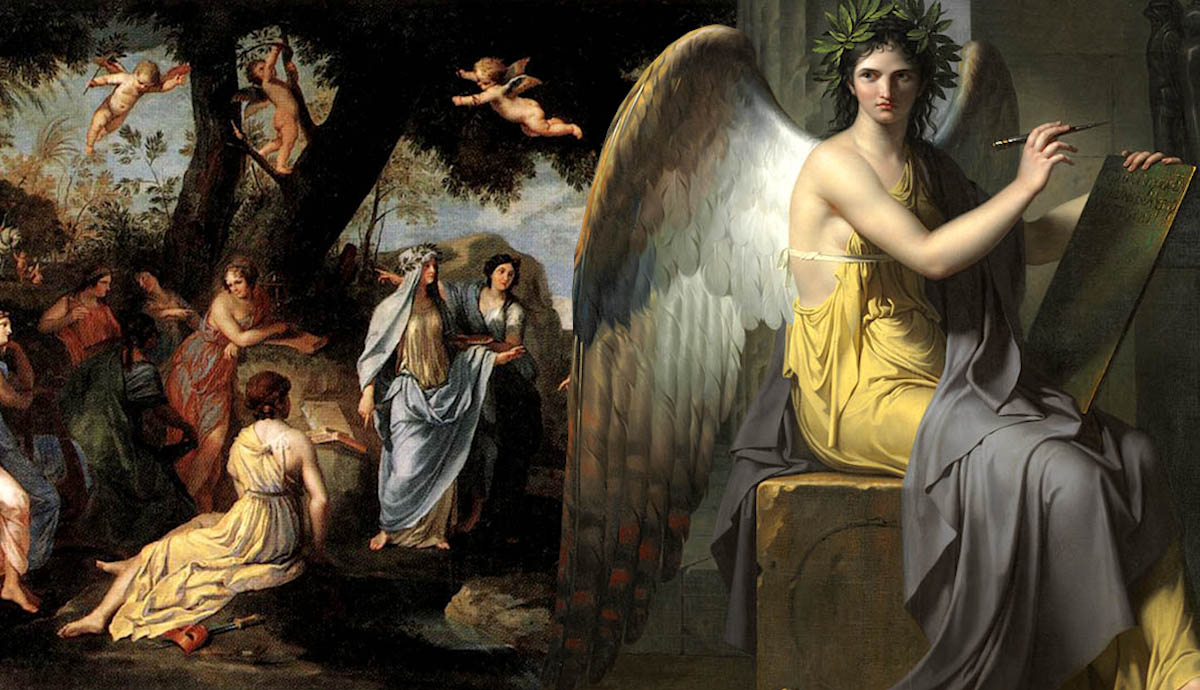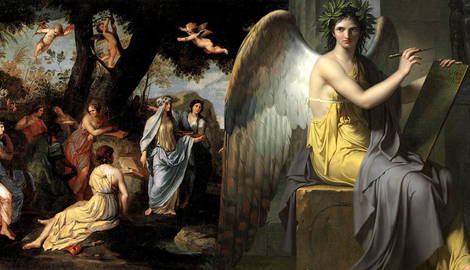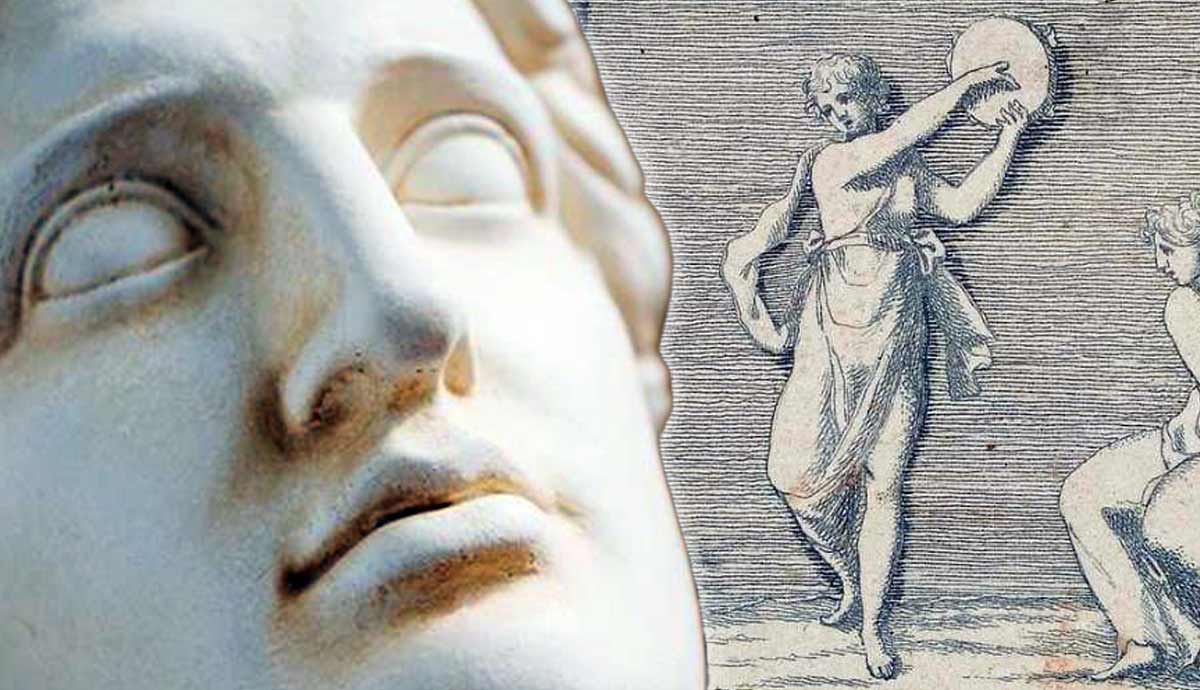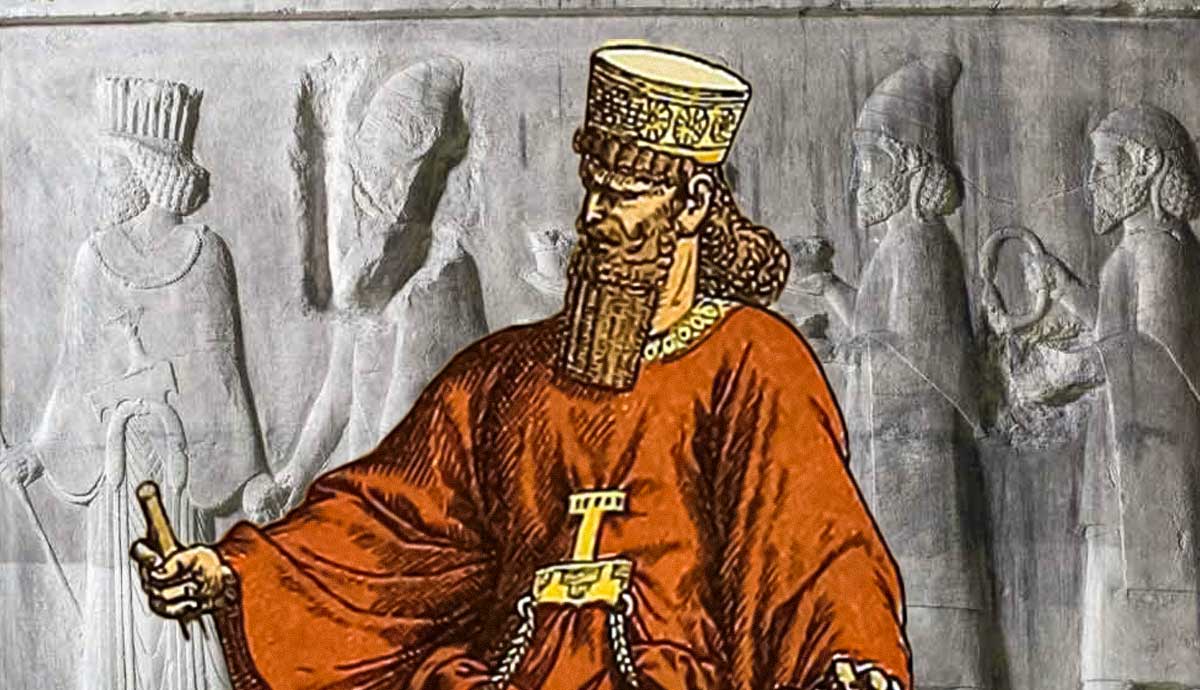
Inspiration is a mystical, intangible thing that grasps the artist, the writer, the inventor, and even the scientist. In Greek mythology, the muses were deemed to be the source of that inspiration. They presided over the arts and sciences, often helping and guiding people towards magnificent ideas and discoveries. It is from “muse” we get the word “museum”, which is fittingly a place where creativity is gloriously displayed. In museums, people are further stimulated and so the cycle of ingenuity continues.
The nine muses were Calliope, Clio, Erato, Euterpe, Melpomene, Polyhymnia, Terpsichore, Thalia, Urania. Read on to discover which arts they represented and the genius individuals who were inspired by them.
Who Are the Muses?

Daughters of Zeus and Mnemosyne, the nine muses were born to enthuse. Zeus was the king of all the Greek gods, and their mother, Mnemosyne, was the Titaness of Memory. Memory was especially fitting as the mother of the Muses because, in a largely illiterate society, memory was essential to remember the works of poets and scientists.
The nine muses lived on Mount Helicon, and they often accompanied the god Apollo, whose domain often overlapped with the Muses. He presided over concepts such as Music, Light, Eloquence, Poetry, and the Sun.
In poetic composition, ancient bards would invoke the muses to help them sing, narrate a story, or remember the great stories of heroes and heroines. The invocation would begin, “Sing, O Muse…”, or “Sing, Goddess…”
1. Calliope

Calliope was the muse of epic poetry and her name translates in ancient Greek as “beautiful-voice”. In artwork, she often appears carrying a scroll or a tablet with famous poetry inscribed upon it.
As the oldest sister, she was the trailblazer of the Muses. Many writers would invoke the power and support of Calliope when composing fantastical poetry about Greek heroes and their adventures.
One of the most famous invocations of the muse is at the beginning of the epic poem, the Iliad. Homer the bard calls to the muse:
“Sing, O goddess, the anger of Achilles son of Peleus,
that brought countless ills upon the Achaeans.
Many a brave soul did it send hurrying down to Hades,
and many a hero did it yield a prey to dogs and vultures,
for so was the will of Zeus fulfilled…”
(Iliad, opening lines)
In older eras, Calliope’s role was recorded as encompassing music, song, and dance as well. Her son, Orpheus, was blessed with her talent, and so he became an unparalleled musician. According to Apollodorus, his singing and talent at the lyre was stirring enough to coax “stones and trees” to move. Philostratus in his Imagines also comments on Calliope’s blessing, describing Orpheus thus: “charmed by his music even creatures that have not the intelligence of man, all the writers of myth agree.”
In ancient Greece, epic poetry was usually accompanied by music. The belief was that if the muse was impressed by the skill of the bard, she would dance to it, and so bestow her favor on the creator.
Propertius says of Calliope in Elegies 3.2: “The Musae (Muses) are my friends, my poems are dear to the reader, and Calliope never wearies of dancing to my rhythms.”
2. Clio

Clio was the muse of history. She had the power to immortalize anyone: whether they were heroes, poets, or politicians. She did this by making their deeds so unforgettable that they would be remembered throughout the eons. “kleio” means “to make famous/renowned”. The common belief was that Clio could bless those she favored with historical immortality.
Statius was a Roman epic writer who wished for his work to be untarnished by time. In his work Thebaid (10. 630), he calls to the muse: “Begin thou, unforgetting Clio, for all the ages are in thy keeping, and all the storied annals of the past.” The Muses were goddesses with great power, and Clio was essential to the memory and future of mankind. Since she knew what deeds would make history, she was knowledgeable about the future. What deeds, in the future, would society want to remember?
Valerius Flaccus acknowledges her power: “Clio . . . to thee, O Muse, has been vouchsafed the power to know the hearts of the gods and the ways by which things come to be.” — Argonautica 3
3. Erato

Of all the Muses, Erato was the one who inspired the most heartache and devotion. She was the muse of love and lyrical poetry. The winged god Eros was a common accompaniment to the muse, and he gave her lots of ideas. Eros was the god of erotic love, and so the pair together could inspire the hearts of writers to create ardent and deep works of art.
Apollonius Rhodius in his Argonautica wrote this, at the beginning of his version of the love story between Jason and Medea. “Come, Erato, come lovely Mousa (Muse), stand by me and take up the tale. How did Medea’s passion help Iason (Jason) to bring back the fleece to Iolkos.”
In Greek myth, this love takes a turn for the worst, and Medea is later deserted by Jason for another woman. In revenge, Medea murders Jason and her own children in a mad rage. Perhaps inspired by Erato, the tale tells of the dangers of passionate and destructive love.
4. Euterpe

“So I sayThank you for the music, the songs I’m singingThanks for all the joy they’re bringingWho can live without it? I ask in all honestyWhat would life be?Without a song or a dance, what are we?So I say thank you for the musicFor giving it to me”
– ABBA, Thank You for the Music
Euterpe was the muse of music and lyric poetry, and these lyrics from the famous ABBA song illustrate the importance of music to culture and human life. In ancient Greece, music was just as cherished, and so this muse’s name translates as “the giver of delight”.
The instruments of choice depicted alongside Euterpe are usually the two-pipe or double-flute and the lyre, which are ancient Greek instruments. Euterpe was said to have invented these and other wind instruments, for mankind to enjoy music. The Muses and their connection to entertainment meant that one of their major roles was entertaining the Greek gods who lived on Mount Olympus.
5. Melpomene

Most of the Muses were patrons of delightful things, but for Melpomene, this was not the case. Melpomene was the Muse of tragedy. In artwork, her role is illustrated by the holding of a dagger, a sword, a tragic mask, or an expression of grieving. This ironically does not reflect her name, which in ancient Greek means “to celebrate with song.” However, this could allude to the tragic, but bittersweet farewell songs of funeral rituals. Through tragedy, one can celebrate the sweetness and brevity of life.
Melpomene was also the mother of the Sirens. The Sirens were beautiful half-woman, half-bird creatures, sometimes depicted as mermaids, who would sing enchantingly to sailors so that they would be lured to their death in the water below. Tragic, in itself.
The playwright Sophocles was said to have been blessed by Melpomene, as his tragedies were very profound. Philostratus writes, “Why do you delay, O divine Sophokles, to accept the gifts of Melpomene?… You can doubtless see the goddess herself imparting to you now sublimity of speech and loftiness of thought, and measuring out the gift with gracious smile.”
Some of Sophocles’ most famous tragedies are Antigone, Electra, The Women of Trachis, and Oedipus. Interestingly, Sophocles often wrote about the woes of women and highlighted their experiences as worthy subjects of tragedy. Most commonly in ancient Greece, tragedy was depicted through the fall of mighty heroes.
6. Polyhymnia

Polyhymnia — sometimes written Polymnia — was the muse of sacred poetry and eloquence. Her name means “many praises”. In the artwork shown above, the bust of the famous orator Demosthenes is behind Polyhymnia. Demosthenes was an Athenian orator who was skilled at powerful speeches, and he usually managed to sway the audience in his favor.
Among his most famous speeches were his Philippics, in which he tried to unite the Athenians against the impending invasion of King Philip of Macedonia.
“In the uncertainty of what the result of my proposal may be for myself, yet in the conviction that it will be to your interest to adopt it, I have ventured to address you. Whatever shall be to the advantage of all, may that prevail!”
(Demosthenes, First Philippic)
Those who wished to give eloquent speeches in the sphere of politics would pray to Polyhymnia and ask for her guidance.
7. Terpsichore

“Receive the god into your kingdom, pour libations, cover your head with ivy, join the dance!”
(Euripides, The Bacchae)
The Muses all enjoyed dancing, but Terpsichore was the one with the dominion over dance and choral song. Her name in ancient Greek means “delighting in dance.” In modern English, her name is the root of many words related to the theme of dance. For example, “terpsichorean” means “relating to dance”, and “terpsichore” is the chosen name for many songs and dance tunes throughout history.
In ancient Greek culture, dance was an important part of the way society understood notions of harmony and the soul. Music and dance were an essential part of education. In ancient Sparta, the traditional education of the Agoge commanded parents to teach their children to dance from the age of five.
Dancing was also a method of praising the gods and celebrating at festivals. The god Dionysus (also known as Bacchus) was especially worshipped through dance. He had a special group of followers called the Maenads who would drink wine and dance frenziedly. Terpsichore would dance alongside them and inspire others to move their feet.
“The dance, of all the arts, is the one that most influences the soul.”
(quote attributed to Plato)
8. Thalia

Thalia was the muse of comedy, and her name means “festivity” in ancient Greek. In art, she holds a comedic mask. In this painting by Jean-Marc Nattier, he captures the mischievous smirk of the muse, under a billowing wrap.
Menander and Aristophanes were two of the most famous ancient Greek comedic playwrights. Their works were punctuated with political satire, dirty jokes, buffoonery, and amusing dances. For example, Old Cantankerous by Menander is a comedy about a grumpy old man trying to prevent his daughter from getting married to an eager young man. Lysistrata, by Aristophanes, is a satire on Athenian society; the women abstain from lovemaking so that their men will stop fighting. Sometimes, comic playwrights would even weave philosophy into their works. Philosophy told through comedy was often a light-hearted way of introducing complicated topics to audiences.
Statius in his Silvae (2. 1. 114) comments on Menander’s skilled ability which is praised by the muse: “If in Grecian dress he declaimed the Attic speech of fluent Menander, Thalia would have rejoiced and praised his accents, and in wanton mood have disordered his comely locks with a rosy garland.”
9. Urania

Apart from music, song, and dance, the Muses also had influence over the scientific sphere. Urania was the muse of astronomy, and so here in the artwork above, she is depicted with a globe. Her crown of stars further symbolizes her influence on astronomical knowledge.
Urania’s name in ancient Greek means “heavenly one” and she was frequently mentioned as having a soft voice and a pleasant temperament. Urania had the power to inspire scientific thought to help humans advance beyond their time. Diodorus Siculus in his Library of History (4. 7. 1) states: “…men who have been instructed by her she raises aloft to heaven (ouranos), for it is a fact that imagination and the power of thought lift men’s souls to heavenly heights.”
Urania also had the power to tell the future. Through divination, she would discern the fate of humans. Due to this, her advice was valued and keenly sought. In the presence of Urania, humans would be inspired to gaze at the stars and ponder.
“Are we human because we gaze at the stars, or do we gaze at them because we are human?”
(Neil Gaiman, Stardust)
The Muses Through History

The Muses were not just integral influences in ancient Greece; their influence pervaded many eras. Romans would celebrate the Muses just as avidly as the Greeks, and during the Renaissance period, a time in which Greek influence was hugely revived, many invoked the Muses.
Poets, writers, and painters, such as Shakespeare, Dante, Rossetti, and Milton all praised the Muses in their works. Shakespeare in Henry V writes, “O for a Muse of fire, that would ascend!” and Milton in Paradise Lost proclaims, “Restore us and regain the blissful seat, sing heavenly muse…”
The term “muse” has evolved to mean “someone who inspires” and so painters have often nicknamed their sitters “muses” because they have inspired their wonderful art. Writers who have been inspired by people in their lives have also often called such people their muses.
Even in the present day, the influence of the Muses is visible. Natalie Haynes’ modern retelling of the Trojan War from an all-female perspective includes chapters from Calliope’s perspective. In the narrative, she responds to the call of an unnamed narrator, helping them to tell the experiences of these women.
Overall, the Muses in myth, and the identified muses of creative thinkers over time, have inspired magnificent discoveries and creations. By doing so, they have encouraged delight in human experience, creativity, and thought.










